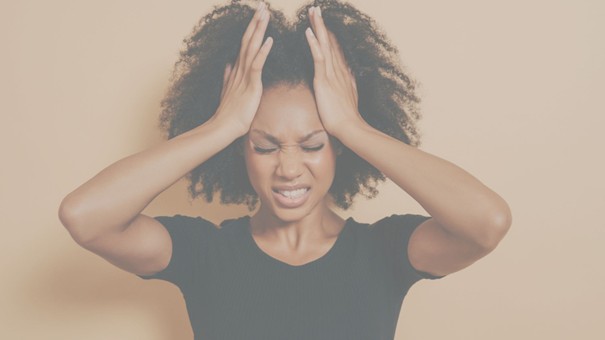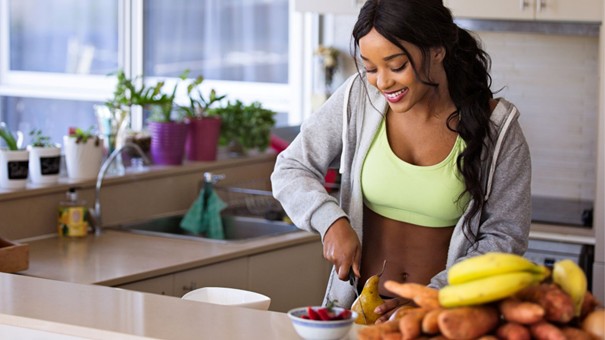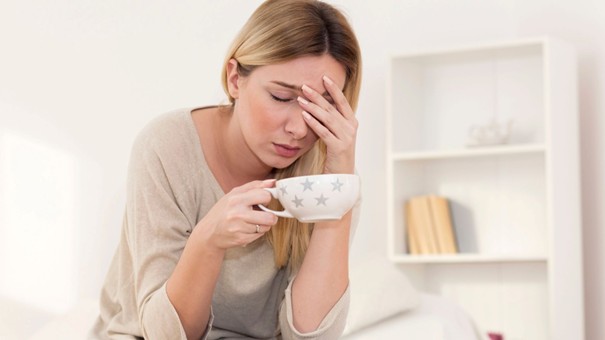
by Dr. Birgit Wogatzky | Jan 23, 2026 | PMS en, Symptoms of nutrient deficiency
PMS, Stress & Inflammation: Why Your Body Isn’t “Overreacting” — and How to Truly Support It
If you’ve ever noticed that PMS hits harder during stressful weeks, you’re not imagining it.
Cramps flare before exams. Irritability spikes during emotional days. Fatigue crashes over you when everything else in life feels loud.
When your world becomes chaotic, your cycle often becomes louder too — almost as if your body is speaking for you.
And it is.
Modern research now confirms what many women have felt for years:
👉 PMS isn’t only hormonal — stress can ignite inflammation inside the brain that intensifies PMS symptoms.
This means your body isn’t “too sensitive.”
It’s reacting intelligently to protect you.
How Stress Changes the Brain During PMS
A major scientific review published in 2025 revealed something groundbreaking:
Stress doesn’t just worsen PMS — it can create neuroinflammation, a type of inflammation inside the brain that affects mood, pain perception, hormones, and energy.
This inflammation influences brain areas responsible for pain sensitivity, emotional regulation, hormone signalling, stress responses, and neurotransmitters like serotonin and GABA.
So when PMS feels unbearable, it isn’t “in your head.”
It’s happening inside your brain’s biology.
This is a crucial shift in understanding PMS — and it empowers us to support the body in smarter, more compassionate ways.
Hormones and Stress Feed Each Other
Your brain and hormones communicate continuously.
During the luteal phase (the days before your period), levels of estrogen and progesterone naturally fall. Normally, these hormones help:
- reduce inflammation
- stabilise mood
- protect the brain
- support stress resilience
When they drop, the brain becomes more sensitive to stress.
Stress then increases inflammation.
Inflammation intensifies PMS.
And the cycle continues.
This loop is not a sign of weakness —
it’s a normal biological response to hormonal and emotional pressure.
How Neuroinflammation Makes PMS Worse
Research shows that inflammation disrupts several key pathways:
- Serotonin balance: inflammation can reduce serotonin activity, weakening mood stability
- GABA activity: reduced GABA increases irritability, anxiety and tension
- BDNF signalling: lower BDNF reduces emotional resilience and stress tolerance
- Pain pathways: inflammation heightens pain processing, making cramps and aches more intense
Stress also increases the permeability of the blood–brain barrier, allowing more inflammatory molecules to enter. This creates a perfect storm during an already vulnerable phase of the cycle.
This is why PMS feels worse when life feels harder.
Your body is not malfunctioning — it’s signalling that it needs support.
How to Calm PMS Naturally: What Actually Helps
Stress and inflammation amplify PMS symptoms, but the encouraging truth is that your body is incredibly responsive to supportive lifestyle habits.
Evidence shows that PMS can improve when you support:
✓ your nervous system
Short breathing exercises, mindfulness moments, or grounding techniques help reduce stress-driven inflammation.
✓ your movement
Gentle activity — yoga, stretching, or walking — improves circulation and eases tension.
✓ your sleep rhythm
Regular sleep stabilises hormones and reduces sensitivity to stress.
✓ your nutrition
Colourful, antioxidant-rich foods help counter oxidative stress and support cellular health.
✓ your anti-inflammatory pathways
Certain plant compounds, particularly turmeric, have been studied for easing PMS-related inflammation.
These strategies don’t replace medical care when needed — but they empower your body’s natural ability to rebalance.
Organic Turmeric: A Natural Anti-Inflammatory Ally for PMS
Turmeric contains curcumin, one of the most researched natural anti-inflammatory compounds.
Curcumin has been shown to reduce inflammatory cytokines, to support mood balance, and to regulate menstrual pain.
This is why Resilovit PrePeriod includes organic turmeric extract.
Paired with targeted micronutrients, it supports:
- antioxidant defences
- natural inflammatory regulation
- reduced cycle-related sensitivity
- a calmer, more resilient nervous system
And it does all this without hormones.
Resilovit PrePeriod isn’t a painkiller.
It’s a holistic self-care solution designed to soothe the inflammation beneath PMS — supporting your body instead of suppressing its signals.
Final Thought: Your Body Isn’t “Too Sensitive.” It’s Asking for Support.
Your cycle isn’t unpredictable.
Your emotions aren’t “too much.”
Your PMS isn’t overreaction — it’s communication.
Your body is responding to stress and inflammation in the only way it knows how:
clearly, intelligently, and protectively.
When you support your nervous system, nourish your body with anti-inflammatory foods, and provide the right micronutrients, PMS can feel:
✨ softer
✨ easier
✨ and far more manageable
You don’t have to push through every month.
Your body deserves the same care it gives you — every single day.
Your cycle doesn’t need control.
It needs compassion.
References:
- Cheng M, Jiang Z, Yang J, Sun X, Song N, Du C, Luo Z, Zhang Z. The role of the neuroinflammation and stressors in premenstrual syndrome/premenstrual dysphoric disorder: a review. Front Endocrinol (Lausanne). 2025 Mar 28;16:1561848. doi: 10.3389/fendo.2025.1561848. PMID: 40225329; PMCID: PMC11985436.
- Samira Khayat, Hamed Fanaei, Masoomeh Kheirkhah, Zahra Behboodi Moghadam, Amir Kasaeian, Mani Javadimehr. Clinical trial: Effect of curcumin on PMS symptoms. Complement Ther Med. 2015 Jun;23(3):318-24.

by Dr. Birgit Wogatzky | Nov 8, 2025 | PMS en, Symptoms of nutrient deficiency
It’s that time again — the days before your period.
You feel bloated, irritable, tired, and not quite like yourself.
Your breasts ache, your mood dips, and even small things feel overwhelming.
Sound familiar? You’re not alone — but here’s the good news:
Science shows that nature offers real, proven ways to help. Certain medicinal herbs can bring your body and hormones gently back into balance — without hormones or harsh treatments.
Here are four of the most effective ones, backed by clinical research.
- Chasteberry (Vitex agnus-castus) — for Hormonal Balance
If your PMS comes with mood swings, breast tenderness, or headaches, chasteberry might be your new best friend.
It works by supporting dopaminergic receptors, helping to reduce prolactin levels and encouraging natural progesterone production — the hormone that calms your system in the second half of your cycle.
💡 What studies show:
Women who regularly took chasteberry reported less breast tenderness, irritability, and headaches, with measurable hormonal balance after just two to three cycles.
👉 Perfect if you want to regulate your hormones naturally, without synthetic options.
- Turmeric (Curcuma longa) — for Calm and Emotional Stability
Turmeric is more than a spice — it’s a natural anti-inflammatory with surprising benefits for mood and energy.
Its key compound, curcumin, influences neurotransmitters like serotonin and dopamine through the BDNF (Brain-Derived Neurotrophic Factor) pathway — supporting mental balance and resilience.
💡 What studies show:
Women who took curcumin during the luteal phase reported fewer mood swings, less fatigue, and lower inflammation-related pain.
👉 Ideal if you feel PMS not only physically, but emotionally too.
- Lady’s Mantle (Alchemilla vulgaris) — for a Smoother Cycle
Known as the “woman’s friend” since medieval times, lady’s mantle supports your body during hormonal fluctuations.
Its tannins, flavonoids, and triterpenes have natural antispasmodic, anti-inflammatory and hormone-balancing properties.
💡 What studies show:
Lady’s mantle helps regulate the luteal phase, soothes cramps, and may support a more regular, balanced menstrual rhythm.
👉 Especially helpful if your PMS involves pain, irregular cycles or lower abdominal tension.
- Ginkgo biloba — for Clarity and Lightness
Best known for improving memory and circulation, Ginkgo biloba has also been shown to relieve both physical and emotional PMS symptoms.
It enhances blood flow, reduces oxidative stress, and supports brain function — all crucial during the premenstrual phase.
💡 What studies show:
In clinical trials using Ginkgo extract, women experienced a significant reduction in PMS symptoms, especially breast tenderness, headaches, and mood swings.
👉 A great choice if you feel mentally foggy or emotionally drained before your period.
The Bottom Line: Science Meets Nature
PMS isn’t something you just have to “put up with.”
Plants like chasteberry, turmeric, lady’s mantle and ginkgo each work on different biological pathways — hormonal, inflammatory and neurological — to help your body find balance again.
Taken together or individually, these herbs offer a gentle, yet scientifically supported approach to easing PMS naturally.
👉 That’s why Resilovit® PrePeriod brings them together with essential micronutrients like magnesium, vitamin B6 and antioxidants — to help you feel balanced, calm, and like yourself again.
Important: If you are pregnant or think you might be, herbal remedies – like any other supplements – should only be used after consulting your doctor or healthcare professional.
FAQ – Herbal Help for PMS
How long does it take for herbal remedies to work?
Most women notice improvement after two to three cycles. Herbal remedies work gently but effectively over time.
Can I combine different herbs?
Yes! Combinations — such as chasteberry with turmeric or ginkgo — can enhance their overall effect.
Are there any side effects?
They’re generally well tolerated. If you have a medical condition, are pregnant or take medication, check with your healthcare provider first.
When should I consider Resilovit® PrePeriod?
If you experience PMS regularly and want a natural, evidence-based way to support your hormonal balance.

by Dr. Birgit Wogatzky | Nov 8, 2025 | PMS en, Symptoms of nutrient deficiency
How Your Lifestyle Shapes How You Feel Before Your Period
It’s that time again — the days before your period.
Your breasts feel sore, your mood swings from calm to chaos, and you just don’t feel like yourself.
You might wonder: Why does PMS hit me so much harder than others?
New research from 2024 shows that your lifestyle, particularly what you eat, how much you move, your weight and even how you sleep can deeply influence how intense you experience PMS.
What Science Tells Us
In a study of 369 medical students, Azadi et al. (2024) found that around 70% of participants experienced PMS, and the severity of their symptoms was strongly linked to:
- Body mass index (BMI)
- Dietary fat intake
- and overall lifestyle habits
Women with higher body fat or diets rich in unhealthy fats reported more intense symptoms — from bloating and irritability to fatigue and pain.
Why?
Excess fat tissue produces oestrogen, and too much of it disrupts hormonal balance.
When oestrogen levels rise relative to progesterone, PMS symptoms can worsen.
How Your Daily Habits Shape Your Hormonal Balance
Eat well
A wholefood, nutrient-rich diet helps stabilise hormones and reduce inflammation.
Experts recommend:
- plenty of fruit, vegetables, legumes, wholegrains, and omega-3s,
- less fat, sugar, salt, caffeine, and alcohol.
These foods support serotonin production, balance blood sugar, and can ease both physical and emotional PMS symptoms.
Move Your Body — Even a Little Helps
Regular exercise, especially aerobic movement like walking, cycling, or dancing, helps regulate your hormones naturally.
It lowers stress hormones such as cortisol and boosts endorphins — your body’s natural mood lifters.
Sleep and Stress Management
Lack of sleep and chronic stress disrupt the delicate relationship between oestrogen and progesterone.
Prioritising rest, mindfulness and relaxation techniques helps your body restore its rhythm.
Maintain a Healthy Weight
According to Azadi et al. (2024), every one-point increase in BMI raised the likelihood of PMS by roughly 7%.
Keeping your weight stable supports hormonal balance and reduces inflammation.
Small Shifts, Big Results
You don’t need perfection — just consistency.
Start with gentle, achievable habits:
- Eat breakfast to keep your blood sugar steady.
- Swap processed foods for colourful, fresh meals.
- Move your body every day, even if it is only for 20 minutes.
- Drink enough water — dehydration worsens headaches and bloating.
And most importantly: be kind to yourself.
PMS isn’t weakness — it’s your body’s way of asking for care and balance.
A Natural Helping Hand: Resilovit® PrePeriod
If lifestyle changes alone aren’t enough, targeted micronutrients can make a difference.
Resilovit® PrePeriod combines chasteberry (Vitex agnus castus), magnesium, vitamin B6, and antioxidants — a synergy proven to regulate hormonal activity and ease PMS symptoms naturally.
For calmer days — and a more balanced you. 🌸
FAQ – Lifestyle & PMS
Does exercise really help with PMS?
Yes! Regular movement reduces stress, improves mood, and relieves cramps and tension.
Can certain foods make PMS worse?
Yes. Diets high in fat, sugar or processed foods can intensify symptoms. Focus on whole, anti-inflammatory foods instead.
Does weight really matter?
It can. Higher body fat increases oestrogen production, which may worsen PMS.
Should I avoid caffeine before my period?
Yes — caffeine raises cortisol, which can amplify anxiety and breast tenderness.

by Dr. Birgit Wogatzky | Nov 8, 2025 | PMS en, Symptoms of nutrient deficiency
When Your Body Takes Over – What’s Really Behind PMS
You wake up and just feel… different.
Everything seems to get on your nerves, your stomach feels bloated, you crave chocolate, and even the smallest thing makes you tear up.
Don’t worry – you’re not “too emotional”. Your body is simply sending you a message: you’re in your luteal phase and experiencing PMS.
What Is PMS, Exactly?
Premenstrual Syndrome (PMS) refers to a mix of physical, emotional and behavioural symptoms that appear a few days before your period – and usually ease once your period starts.
Up to three in four women experience PMS at some point in their lives. For some, it’s just a mild inconvenience. For others, it can make daily life feel completely overwhelming.
Common PMS symptoms include:
- Physical: headaches, cramps, breast tenderness, bloating, fluid retention, digestive changes
- Emotional: irritability, mood swings, sadness, anxiety, poor concentration
- Behavioural: cravings, sleep problems, fatigue, withdrawal
Why Does PMS Happen?
PMS is thought to result from hormonal fluctuations during the menstrual cycle and changes in brain chemistry – especially low levels of serotonin, the so-called “feel-good” hormone.
Lifestyle factors such as stress, diet and lack of sleep can make symptoms worse.
- Hormones on a Rollercoaster
The rise and fall of oestrogen and progesterone in the second half of the cycle (the luteal phase) can trigger stronger PMS symptoms in sensitive women.
- Serotonin and Brain Chemistry
Women with PMS often have lower serotonin levels, which affects mood, appetite, sleep and pain perception – leading to irritability, sadness, cravings and restlessness.
- Lifestyle & Other Triggers
- Diet: Too much sugar, salt and saturated fat can worsen bloating and mood swings.
- Substances: Alcohol, caffeine and nicotine can intensify symptoms.
- Lack of movement: Sedentary habits and poor sleep increase fatigue and tension.
- Stress: High cortisol levels disrupt hormonal balance and amplify PMS.
- Nutrient gaps: Deficiencies in magnesium or calcium can play a role.
- Genetics: PMS often runs in families, suggesting a hereditary component.
Natural Ways to Manage PMS (No Hormones Needed)
- Nourish your body
- Choose complex carbs like oats or wholegrains to stabilise blood sugar.
- Eat plenty of fruit and veg for fibre and antioxidants.
- Include oily fish (salmon, mackerel) for omega-3s that reduce inflammation and cramps.
- Snack on nuts and pulses for steady energy and fewer cravings.
- Move and stretch
Exercise lowers stress hormones and boosts your mood. Even a brisk walk, yoga or light workout can make a big difference.
- Lower your stress levels
Relaxation techniques like meditation, journalling or mindful breathing can calm your nervous system and ease PMS tension.
- Prioritise good sleep
A consistent sleep routine and screen-free evenings can balance your hormones and reduce irritability.
- Try herbal support
Vitex agnus-castus (chasteberry) is one of the most researched herbal remedies for PMS – shown to help with mood swings and breast tenderness.
Extra Support: Resilovit® PrePeriod
If lifestyle changes alone don’t do the trick, targeted nutritional support can help.
Resilovit® PrePeriod combines chasteberry with plant extracts, antioxidants and key micronutrients – designed to support hormonal balance and ease PMS naturally.
Because you deserve to feel like yourself again – calm, centred, and in control.
FAQ: Your PMS Questions Answered
How long does PMS last?
Typically, PMS starts three to ten days before your period and eases once bleeding begins.
Why do I crave chocolate so much?
Low serotonin and fluctuating blood sugar trigger cravings for carbs and sweets that temporarily boost mood.
Can PMS be prevented?
Not completely – but a healthy lifestyle with balanced nutrition, regular movement and stress management can make a huge difference.
What natural supplements help with PMS?
Chasteberry, magnesium, B vitamins and antioxidants such as curcumin are supported by studies for PMS symptom relief.
Final Thoughts
PMS isn’t “all in your head” – it’s a genuine interplay between hormones, brain chemistry and lifestyle.
The good news? You can do something about it. With nourishing foods, movement, rest and micronutrient support, you can restore your balance naturally.
👉 With Resilovit® PrePeriod, you get targeted support designed to help you feel like yourself again – every cycle.



